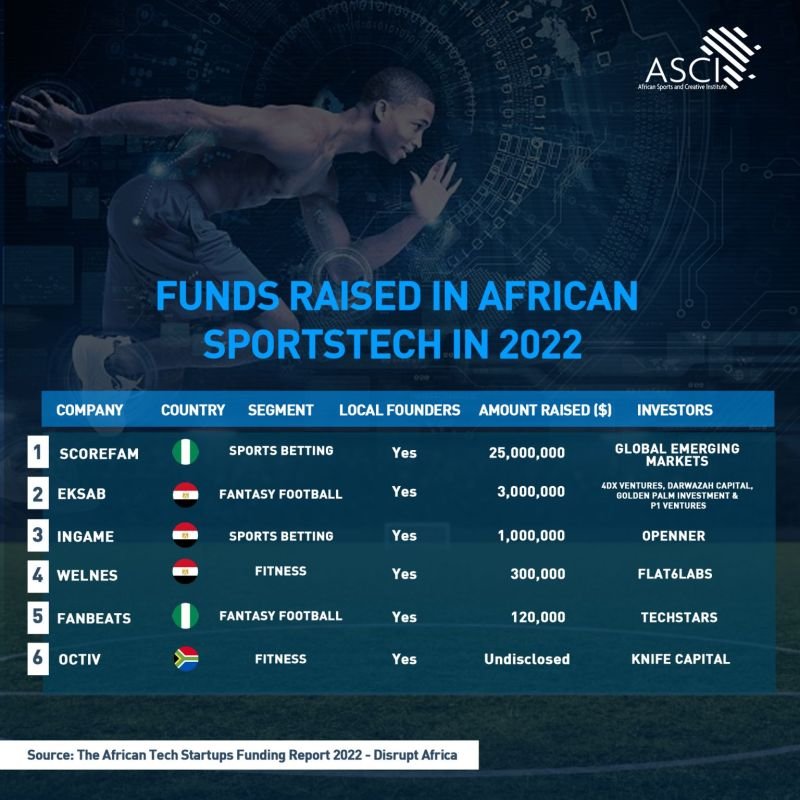What happened in the African Creative and Sports space in February 2023? Quite a lot.
Scroll down for the low-down.
BIG NEWS OF THE MONTH: VIDEO STREAMING
The plot thickens in the African streaming space 🤔.
🤝 Leading local platform Showmax, which is owned by the South African MultiChoice Group, has partnered with Comcast's NBCUniversal and Sky to relaunch as a bigger and stronger OTT offering on the African market.
The new Showmax group will be 70% owned by MultiChoice and 30% owned by NBCUniversal.
🔥Showmax 2.0 will combine MultiChoice’s popular local content with international content licensed from NBCUniversal and Sky, third-party content from HBO, Warner Bros. Entertainment, Sony Pictures Entertainment and others, as well as live English Premier League football matches -- which is possibly the most attractive and valuable content property on the African market.
💪🏿This is a big, bold move that puts Showmax in the right position to compete properly with Netflix, Amazon and Disney+ on the continent.
Remember as well that Vivendi's CANAL+ Group, leader on the francophone market, now owns more than 30% of MultiChoice Group, and that both entities have been busy ramping up their investments in quality African original co-productions.
😅 For NBCUniversal, whose streaming service Peacock has been struggling in the US, it's a strategic move to capture one of the last emerging markets still up for the taking.
💰This type of consolidation signals more opportunities and bigger budgets for African content producers in the near future.
IN THE PRESS
I spoke to African Business Magazine about the state of the African entertainment industry today.
My key thoughts:
📈 The entertainment sector in Africa is still very much emerging and we have barely scratched the surface of what can be achieved by investing in African creativity
👷🏾 Africa’s entertainment industry is in the process of structuring itself
💵 Governments and DFIs (development financial institutions), such as African Export-Import Bank (Afreximbank), IFC - International Finance Corporation, Agence Française de Développement, PROPARCO, and African Development Bank Group, are now looking seriously at the creative sector as a source of growth and job creation
📡 Tech giants such as Google/YouTube, Facebook/Instagram, Netflix or Amazon know that their next billion users will come from Africa, so they are investing heavily in the continent’s internet infrastructure
📱The recent growth in internet penetration, smartphone ownership, online payments and monetisation tools have finally given African creators access to the global online marketplace
🌍 All countries have a huge potential for growth, but some are distinguishing themselves in specific ways:
#Nigeria, the powerhouse
#Ghana, dynamic and strategic
#SouthAfrica, skilled talent pool servicing the world
#Kenya, the start-up hub
#Senegal, the cultural & sports capital
#Egypt with gaming #Tunisia with animation and #Morocco, with design, arts & crafts
but also #Rwanda, #IvoryCoast or #Benin
MUSIC
🎉 Congratulations 🎉 to Nigerian singer Tems who became the first home grown female Nigerian artist to win a Grammy.
🎤 Tems was recognized for her vocals and ad-libs on Future's song “Wait For U,” featuring Drake, which won Best Melodic Rap Performance.
✨ This win also comes a little over a month before the 2023 Oscars where Tems could once again make history as the first Nigerian artist to ever win an Academy Award thanks to her co-writing credit on Rihanna’s “Lift Me Up” off the Black Panther: Wakanda Forever soundtrack.
Other African artists to have won (at least!) one Grammy include: Ali Farka Toure (Mali), Angelique Kidjo (Benin), Black Coffee (South Africa), Burna Boy (Nigeria), Cynthia Erivo (US/Nigeria), Dave Matthews (South Africa), Femi Kuti (Nigeria), King Sunny Adé (Nigeria), Ladysmith Black Mambazo (South Africa), Lebo M (South Africa), Lekan Babalola (Nigeria), Miriam Makeba (South Africa), Nomcebo Zikode (South Africa), Oumou Sangaré (Mali), Owuor Arunga (Kenya), Robert John "Mutt" Lange (South Africa), Sade Adu (UK/Nigeria), Sikiru Adepoju (Nigeria), Soweto Gospel Choir (South Africa), Tinariwen (Mali), Trevor Rabin (South Africa), Wizkid (Nigeria), Wouter Kellerman (South Africa), Youssou Ndour (Senegal).
🎤 Six-year-old music festival Afrochella, which takes place in Ghana 🇬🇭 over the Christmas period, will be rebranding to AfroFuture this year after running into some IP issues 🤨 with US festival Coachella 🇺🇸.
🌍 In 2019, Afrochella was the anchor event for The Year of the Return campaign encouraging African-Americans and other people of African descent to come discover the continent. It remains one of the few festivals focused on African music that are able to attract a global crowd.
In the same category are the powerhouse Afronation (Miami, USA/May, Portimão, Portugal/June, Ghana/TBD) and uber hipster Afropunk.
💡 These festivals have been instrumental in showcasing African culture to the world, but also in supporting the growth of African music:
✅ They are a major source of soft power for the host or sponsor country
✅ They introduce a variety of African music genres to a core audience of music lovers
✅ They enable meetings and collaborations between African and global artists
✅ They provide a source of solid revenue for African artists, as performance is still the main way musicians make money despite the rise in streaming
✅ They fill a gap in a continent that suffers from a critical lack in performance venues
We've only scratched the surface of how African creativity can be presented to the world through events and experiences.
Great things happen when you mix music 🎧 and fashion 👓.
As African music's influence continues to grow worldwide, more collaborations between top African artists and global brands looking to build cultural cachet are taking place.
🔥 In November last year, Burna Boy performed at Rihanna's Savage X Fenty Vol. 4 runway show.
🔥 Burna Boy was also tapped by Burberry for its ‘The Night Before’ festive campaign.
💡 But African artists' star power also represents an opportunity for smaller African fashion brands to gain international exposure.
👟 More specifically, partnering with a rising music star from the continent could be key for African streetwear brands, which are not that well known locally.
They might find that it's easier (and much more lucrative) to appeal to the diaspora or to global music fans.
👉🏿 Examples to emulate include diaspora-founded streetwear brands such as Amsterdam-based Daily Paper or London-based ABAGA VELLI, as well as Nigeria's Ashluxe.
FILM
British Hollywood actor Idris Elba, who is of Ghanaian and Sierra Leonean descent, recently announced that he was working on a plan to open up film studios across Africa 🎥.
More specifically, he met with the presidents of Ghana and Tanzania to discuss the underlying policies and tax incentive packages that would also be needed in order to make such a project successful.
🤓 In my UNESCO report on the African Film & Audiovisual sector, I put forward 4 strategic models for African countries seeking to develop their film industries.
In my view, governments can choose to pursue one specific model or combine several together, depending on their ambitions and the resources at their disposal.
💡Opening film studios and other film infrastructure is a key component of the Service Model, in which a country positions itself to become to production service center for global projects.
The Service Model is potentially very lucrative. It is based on:
✅ Investment in solid transport, hospitality and film infrastructure, including film studios
✅ A local pool of well-trained technical professionals
✅ A diversity of natural shooting locations and a temperate climate
✅ English as an official or widely-spoken language
✅ Political stability
✅ Attractive co-production treaties and tax rebates
Some African countries already pursuing this model include: #SouthAfrica, #Morocco, #Mauritius, #Namibia.
But many more countries present the right profile: #Ghana and #Tanzania for example, but also #Kenya (an early leader who has not yet worked out its incentive package), #Rwanda, or even #Zimbabwe.
💰 Funding is now becoming available for such projects. If you are a developer with a serious project (feasibility study, business model, government support), please send me a DM.
SPORTS BUSINESS
💰 African tech startups raised a record amount of money in 2022 - anywhere between $3 and $5.4 billion, depending on the source (Disrupt Africa, Briter Bridges, Africa: The Big Deal or Partech) and their calculation method.
⚽️ Out of this amount, about $30M, or less than 1%, went to sports-related companies, according to ASCI - The African Sports & Creative Institute.
Considering their size, the stage of development of their tech ecosystem, and their homegrown armies of sports fans, it's no surprise that Nigeria and Egypt dominate this sector.
Most of the sports ventures that raised money in 2022 are also either 🎰betting or 🎮 gaming startups.
There is no doubt that there's still a lot of opportunities to explore in that space.
But here's another one:
As 🏃🏿 athletes of African descent dominate just about any sport on the planet, is there any performance tracking solution that African sports scientists and data analysts could develop for the world?
African countries are edging their way in the global ⚽️ football transfer markets.
Transfer data is important because it is a key indicator of players' value based both on their intrinsic skill levels and on their country's and club's ability to develop and market these skills.
Here are some key facts from the recently released 2022 FIFA Global Transfer Report:
🏆 Nigeria, Ghana, and Ivory Coast are among the top 10 countries globally in the number of transfers made in the Men’s Football category.
#Nigeria ranked 5th, with 725 transfers earning $104.2M.
#Ghana ranked 8th, with 515 transfers earning $17.4M.
#IvoryCoast ranked 9th, with 428 transfers earning $38.3M.
⚖️ At the club level, African countries earned more than $71.2M from selling players and spent only $14.5M to acquire others.
💸 The biggest spenders in player acquisition fees are clubs from South Africa, Tunisia, Egypt, Sudan, Libya, and Morocco.
💰 Clubs from Ivory Coast and Tunisia made the most revenue from transfers. Clubs from Burkina Faso, Cameroon, and Morocco also earned revenue from transfers.
🏃🏿 The Women’s Football category also showed significant transfer market growth both globally and at the continent level.
#Nigeria (6th) was the top ranking African country in the Women's category with 53 transfers (+29% from 2021).
#Ghana ranked 10th with 38 transfers (+90% since 2021).
Although the growth should be celebrated, these numbers are all very low compared to the massive potential of African football players.
We should be talking about billions here, not millions.
💡 Investing in the player identification and training pipeline is a massive opportunity for governments, local organizations, development institutions, and private companies.


